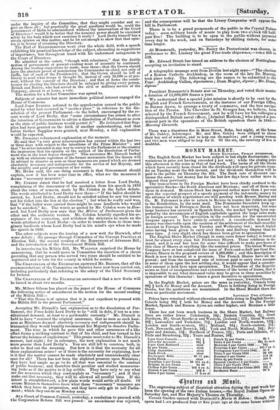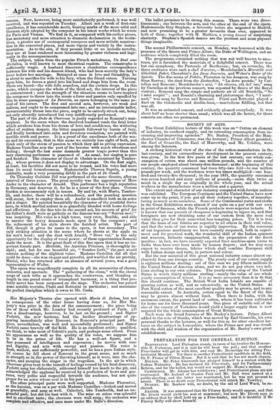'ijtutrr uu 3iuir..
The engrossing subject of theatrical attention during the past week has been the opening of the two Italian houses,—the Royal Italian Opera oil Saturday last, and Her Majesty's Theatre on Thursday.
Covent Garden opened with Donizetti's Maria ii Re/ion: though this opera had I sen produced four er five years ago at the same house without success. Now, however, being more satisfactorily performed, it was well received, and was repeated on Tuesday. Albeit not a work of first-rate excellence, it has considerable merit, bearing marks of the more solid and German style adopted by the composer in his latest works which he wrote for Paris and Vienna. We find in it, as compared with his earlier pieces, less monotony and more attention to dramatic declamation in the recita- tives, a greater use of contrapuntal resources and more artistic oonstrue- eon in the concerted pieces, and more vigour and variety in the instru- mentation. .As to the airs, if they present little or no melodic novelty, they are at least rendered more interesting by greater richness and inge- nuity in the accompaniments. The subject, taken from the popular French melodrama, Un Duel sous Richelieu, is well known to most theatrical readers. The catastrophe is sufficiently tragic. A husband discovers a clandestine correspondence between his wife and his dearest friend, who had been 'secretly the lady's lover before her marriage. Betrayed at once in love and friendship, he is about to sacrifice his wife to his fury, when the friend enters. Turning upon him, he forces a pistol into his hand and drags him from the room. Shots are heard—the wife falls senseless, and the curtain drops. In this scene, which occupies the whole of the third act, the interest a the piece is concentrated ; and the strength of the situation seems to have inspired the composer to throw into the music a force and passion only equalled by him in some passages of La Favorite, an opera belonging to the same pe- riod of his career. The first and second acts, however, are weak and tedious, and ought to be compressed into one; and an interminable ballet, unwarrantably thrust into the piece, ought to be entirely struck oat, being not only absurdly introduced but very indifferently performed.
The part of the Duke de Chevreuse is justly regarded as Ronconi's mas- terpiece. In the scene where the deceived husband reads the fatal letter which awakens him from his dream of love and confidence, the withering effect of sudden despair, the bitter anguish followed by bursts of fury, and finally hardened into calm and ferocious resolution, are painted with terrible truth and power. It is a proof of the excellence both of the mu- sic and its execution, that in this scene we entirely lose sight of both, and think only of the storm of passion to which they aid in giving expression. Madame Casten= acts the part of the heroine with much sweetness and feeling ; though the last scene demands greater tragic power than this very charming performer is possessed of. As usual, her singing is pure and finished. The character of Count de Chokes is sustained by Tamber- lik ; whose powers it does not display to advantage. On the first night, at least, his faculties did not seem to be roused, and his voice had more than its usual tremulousness. Mademoiselle Theresa Seguin, a young contralto, made a very promising debt in the part of De Gtmdi.
On Thursday Gulielmo Tell was performed at the same theatre, after an interval of three years. The great novelty was the appearance of Herr Ander in the character of Arnold. This performer has a high reputation in Germany, and deserves it, for he is a tenor of the first class. Covent Garden is uncommonly rich in tenors. By and by, with Mario, Tambor- a, and Ander, there will be a redundancy, and the puzzling question will occur, how to employ them all. Ander is excellent both as an actor and a singer. He painted beautifully the character of the youthful Swiss hero, in which martial ardour is so gracefully blended with home feelings and affections. In the fine trio in the second act, his accents of grief for his father's death were as pathetic as the famous war-cry- " Suivez moil" was inspiring. His voice is a high tenor, very even, flexible, and able to answer the heavy demands made upon it by the composer ; and the refinement of his style shows the finished artist. The part of Tell, though it gives its name to the opera, is but secondary. The only striking situation is the scene where he shoots at the apple on his son's head ; and the duet with Arnold, "Dove vai," is the only opportunity for the display of vocal power : of these opportunities Ronconi made the most. It is the great fault of this fine opera that it has no im- portant female part. Mathilde, the Austrian Princess, is thoroughly in- sipid; and, but for one beautiful air, "Sombre foret,"" the part would contain nothing of the slightest value. Madame Castellau did all that could be done—she was elegant and graceful, and warbled the air prettily. Marini, who has returned after an absence of several years, was a good representative of Walter.
The opera was magnificently complete in all its accessories of chorus, orchestra, and spectacle. The "gathering of the clans," with the choral songs of each tribe as it approaches the rendezvous, and blending at length in one grand strain of triumphant harmony, is a thing that pro- bably never has been surpassed on the stage. The orchestra has gained some notable recruits, Piatti and Bottesini in particular; and maintains the perfect discipline which it owes to Mr. Costa.



























 Previous page
Previous page